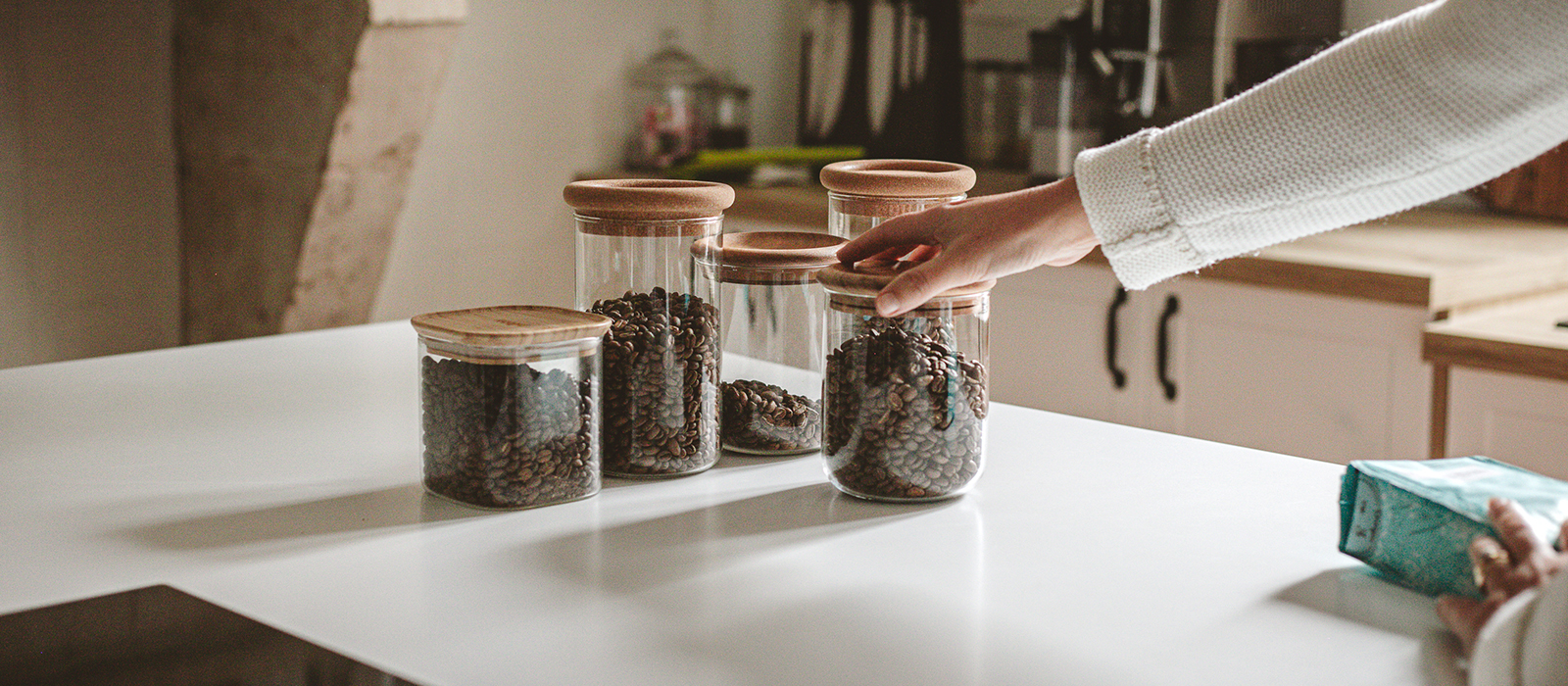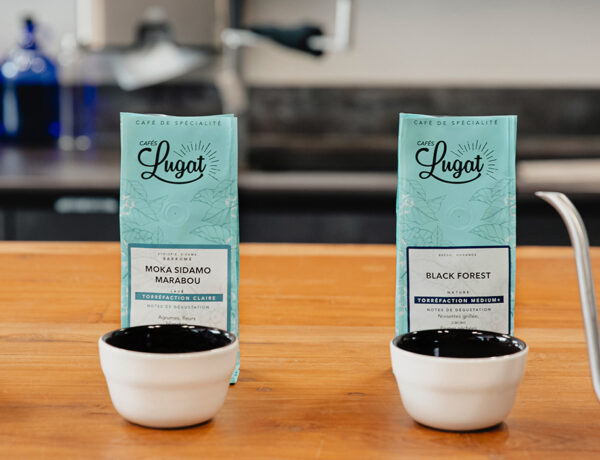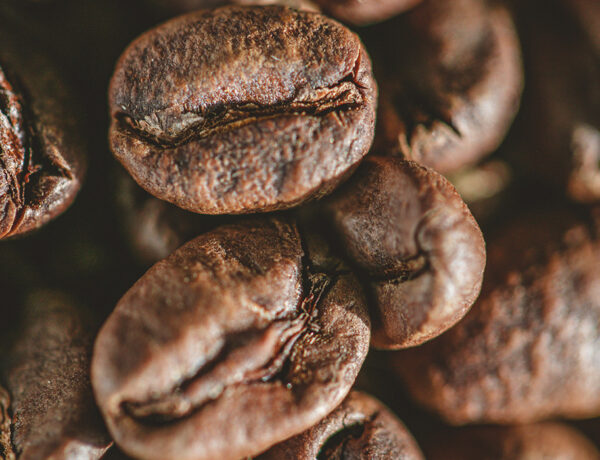
- Home
- The Best Organic Coffee Beans: Our Selection
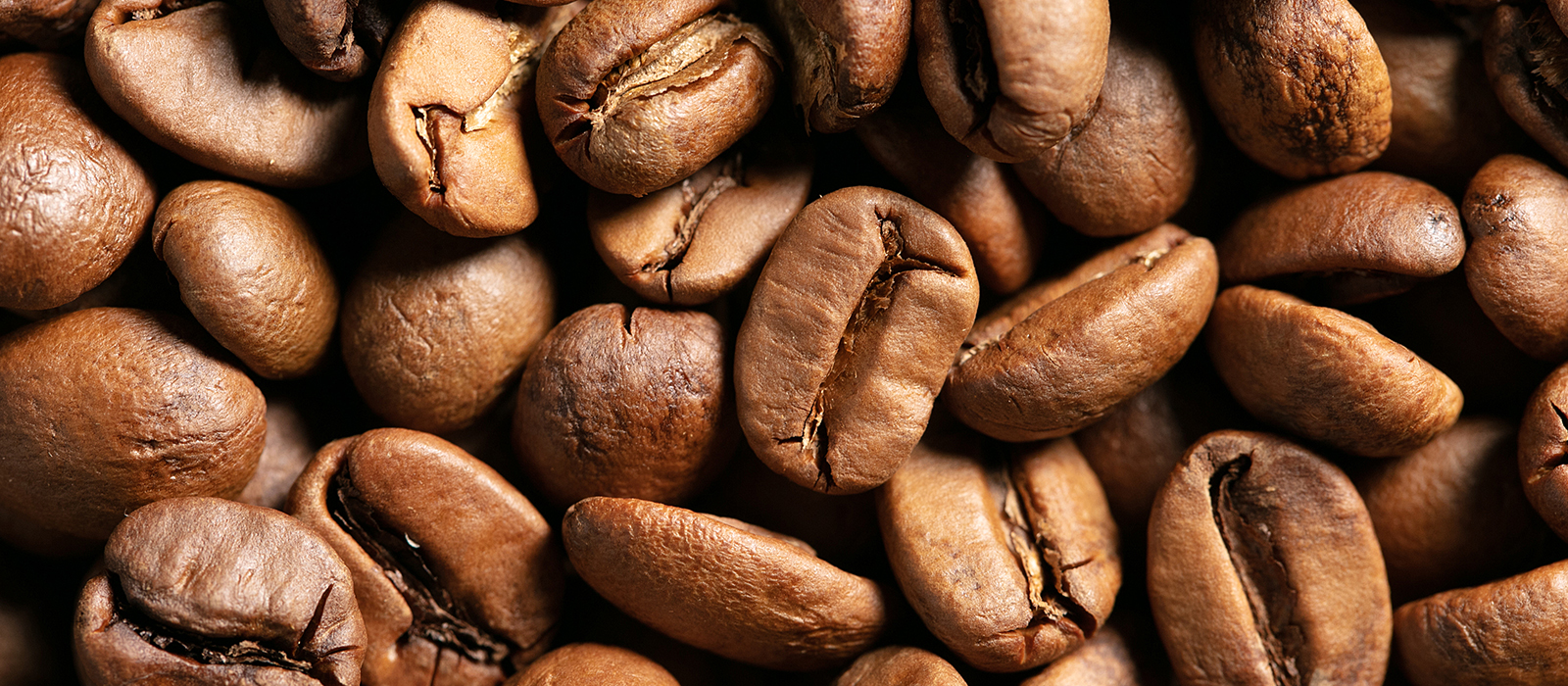
The Best Organic Coffee Beans: Our Selection
Written by Alice
Reading time 8 minHigh-quality beans are sought after by most coffee enthusiasts and have been for many years. However, in recent years, coffee lovers have also become increasingly conscious of the environmental impact of coffee production and are looking for the best coffee options that align with their values. One of the best options is, of course, to opt for organic coffee beans. However, it is not always easy to understand the various certifications that are given to organic or ethically-produced coffees. To clarify things for you, we’ve detailed the most common certifications and deciphered the criteria. We have also asked our experts to put together a selection of the best organic coffee beans to make it easier for you to stick to your values.
What Is Organic Coffee?
In very simple terms, organic coffee is coffee that is grown without the use of synthetic pesticides, herbicides, or fertilizers. Despite being widely used in agriculture, these chemicals are harmful to the environment, wildlife, and even our health. Organic farming practices rely on natural methods, such as crop rotation, companion planting, and biological control agents, to maintain soil health, control pests and diseases, and boost biodiversity. Organic coffee is more sustainable than conventional coffee, as it does not contribute to water pollution or the overuse of pesticides.
Is Organic coffee the same as speciality coffee?
In short, no. While some speciality coffee can be organic, the two terms are not synonymous
The fundamentals of speciality coffee are:
- Traceability
- Coffees rated over 80/100
- Zero defects in the cup
- Fair remuneration for the producer
So, if you buy organic speciality coffee, you will have even more traceability than you already have with non-organic speciality coffee. Speciality coffees are coffees with such a high score that they cannot be grown intensively. These batches require special care to preserve the plant and avoid stressing it. This is what makes it possible to achieve quality at this level. Chemical inputs may sometimes be used, but are generally kept to a minimum.
The Cost Of Organic Coffee
Certifications are not free and can cost a lot of money, particularly for organic farming. This means that certified organic coffee is almost always more expensive than non-organic coffee. This also means that some farms can’t afford to pay for certification because they don’t have the financial means, even though their coffees could claim to be organic.
Organic Coffee Certifications
Several different organizations certify organic coffee, and these will largely depend on your country of residence. In the UK, organic food must be certified by an approved UK organic control body. The certification process involves following strict guidelines laid down by national and international law, keeping thorough and accurate records of production processes, and allowing annual and random inspections. To label a product as organic in the UK, at least 95% of the agricultural ingredients must be organic, and all other ingredients, additives, and processing aids must be listed as permitted within the organic regulations.
Here are the most common organic certifications in the UK:
Soil Association: The Soil Association is a UK-based organisation that is known for its strict organic standards. Its organic standard is even stricter than the EU Organic Regulation in some areas, such as the use of pesticides and fertilizers.
Organic Farmers and Growers Association (OF&G): The OF&G is a UK-based organisation that is similar to the Soil Association. Its organic standard is similar to the EU Organic Regulation, but it may have more stringent requirements for specific types of products.
In the EU, the most common label is the EU Organic Regulation and Logo scheme. To obtain the EU organic certification and label, products must comply with the EU organic regulation (EU) 2018/848, which guarantees various aspects such as climate and environment protection, soil fertility conservation, biodiversity preservation, and transparent labelling for consumers. This certification ensures that “organic” means the same for consumers and producers across the EU.
In the US, the certification is USDA Certified Organic. It is administered by the USDA’s National Organic Program (NOP) and is based on the EU Organic Regulation.
When it comes to coffee, it is important to note that some coffees may be organic but do not have any labels or certifications. Obtaining a certification has a significant cost. For example, in Ethiopia, a large proportion of coffees are organic, but the producers do not pay for certifications because they are very expensive.
However, without an Organic label, the consumer has no proof that the protocols have been followed, so the coffee may or may not be organic.
What Are The Criteria For Organic Produce?
Specific criteria vary from one label to the other, as certain regulating bodies have stricter requirements than others. However, as a rule, to be certified as organic, coffee and most other produce must meet all of the following requirements:
- No synthetic pesticides, herbicides, or fertilizers
- No genetically modified organisms (GMOs)
- No irradiation: Irradiation is a process that uses high-energy radiation to kill pests and bacteria. It is not allowed in organic coffee products, as it can damage the flavour and nutrients of the coffee beans.
- Pure soil: The coffee must be grown on land that has been pesticide and chemical-free for at least 5 years
- Extensive Traceability: Organic coffee must be traceable from the farm to the supermarket. Farmers must be able to document the origin of their coffee beans and roasters and retailers must be able to verify that the coffee they are selling is organic.
- No processing aids: Processing aids are chemicals that are usually used to help coffee beans be processed and stored.
- Storage: Organic coffee must be stored in dedicated areas. It cannot be stored next to or on top of a non-organic product. Generally speaking, all tools that handle organic products must be identified and never come into contact with coffee or any other non-organic material.
If any of these criteria are not met, the coffee may lose its label and be downgraded to non-organic. It is also important to note that the whole production chain has to be certified to claim to be organic: the coffee grower, the exporter, the importer and the roaster.
Organic Coffee vs. Other Certifications
So, the benefits of organic coffee are clear. You are guaranteed coffee that is pesticide and chemical-free, environmentally friendly and with a greater traceability. If you’re wondering about how this works for coffee blends, rest assured that blends can only be certified if 100% of the coffees making up the blend are certified organic.
But what about other certifications? You will often find several labels on one packet of ground coffee or coffee beans. One very common one you’ll find is the Fairtrade logo. Organic and Fairtrade have nothing to do with one another. You can find non-fairtrade organic coffees or non-organic fairtrade coffees. But there are also organic and fair trade coffees. The Fairtrade certification ensures that producers receive fair prices for their products and that farmers and workers improve their living standards.
Another common label is the Rainforest Alliance logo. The Rainforest Alliance works to protect forests and biodiversity, but also to improve the lives of farmers and forest communities.
Our Organic Coffee Beans Selection
Cafés Lugat – Organic Coffee Beans Las Planadas from Colombia – 250g
The rich and sweet Las Planadas Colombian coffee beans, with dominant notes of red berries, are grown on the Granja La Esperanza family farm, located in the southwest of Colombia. This medium roast organic Arabica blend reveals notes of cocoa, blackcurrant, and walnut. These beans are especially good for an exceptional espresso.
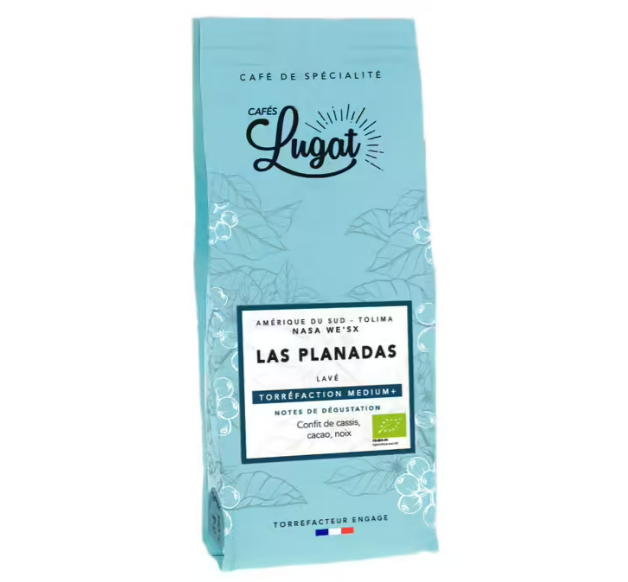
Coffee beans – Las Planadas – Cafés Lugat (250g)
– 100% Arabica
– Rich & sweet aromatics and red fruits
– Notes of cocoa, walnut and blackcurrant jam
Cafés Lugat – Organic Coffee Beans Moka Nekemte – 250g
This medium roast specialty 100% Organic Arabica Moka is exceptional. Artisanally roasted in France, these Moka Nekemte organic coffee beans reveal floral and fruity notes, with particular notes of lemon zest, jasmine and candied orange.
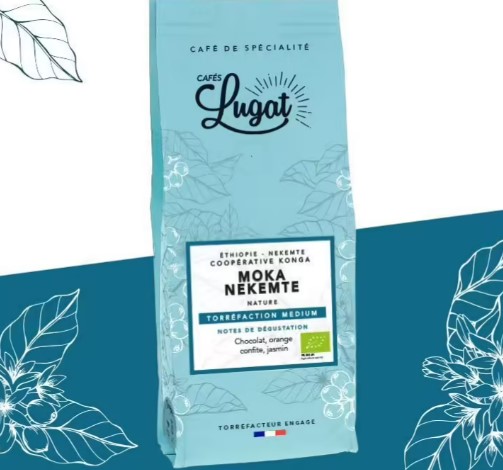
Coffee beans – Moka Nekemte – Cafés Lugat (250 g)
– Floral and fruity notes
– 100% Organic Arabica
– Rich & sweet and citrus aroma
Cafés Lugat – Moka Yirgacheffe Organic Specialty Coffee Beans from Ethiopia – 250g
Another favourite of ours, this light roast from Ethiopia is a specialty coffee with notes of dates & bergamot. If you’re a fan of citrus and floral coffees, this will be the one for you. It is especially good for Slow Coffee.
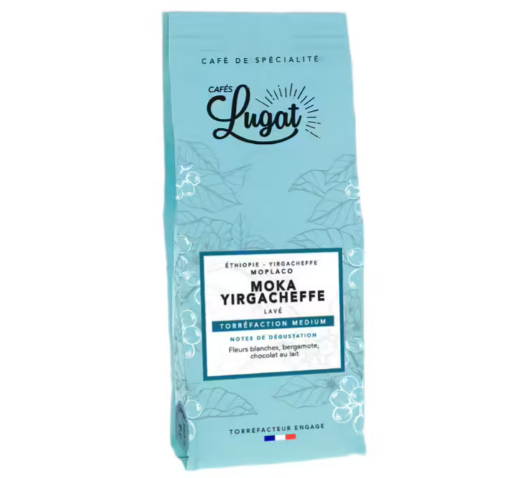
Organic coffee beans – Moka Yirgacheffe – Cafés Lugat (250g)
100% Arabica – Moka (Ethiopia)
Notes: white flowers, bergamot, milk chocolate.
Roasted in France
Green Lion Coffee – Organic Coffee Beans Moka Baraka Ethiopia – 250g
If you like your morning cup of coffee to be a medium roast, 100% arabica, rich & sweet with notes of citrus, then look no further. Green Lion Coffee is a brand that grows its coffee beans with respect for the environment and biodiversity. This particular coffee is roasted in France and offers a balanced cup with floral & fruity notes.
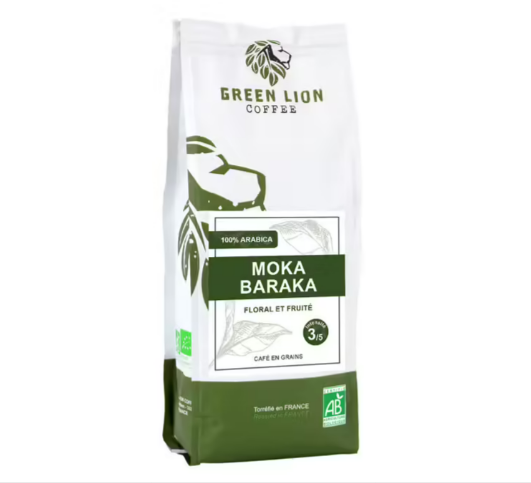
Coffee beans – Moka Baraka – Green Lion Coffee (250g)
– 100% Arabica blend
– Rich & sweet aromatics and yellow fruits
– Chocolate and citrus notes
Green Lion Coffee – Organic Decaf Coffee Beans Sweet Dreams – 250g
These 100% Arabica beans are not only organic but they are also decaffeinated using a water process, which is 100% chemical-free and helps to preserve all the aromas. Sit down and enjoy a cup of coffee with smooth notes of spices and biscuits.
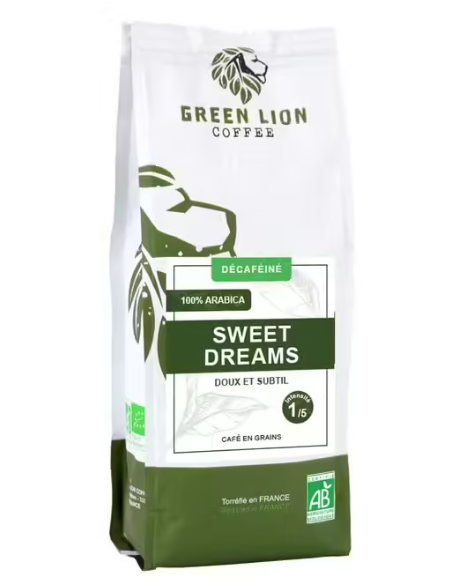
Coffee beans – Sweet Dreams – Green Lion Coffee (250 g)
– Biscuit and spicy notes
– Certified organic and Fairtrade
– 100% Chemical-free
Green Lion Coffee – Monte Verde Organic Coffee Beans – 1kg
Certified Organic & Fairtrade and roasted in France, this 100% Arabica coffee is a relatively dark roast. These Monte Verde organic French roast coffee beans bring out smooth notes of cocoa for a full-bodied coffee with a long finish.
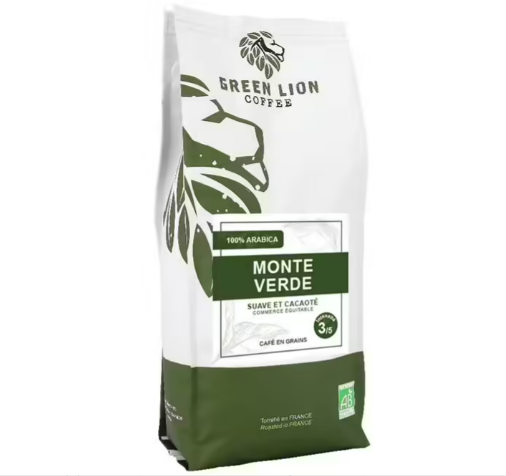
Coffee beans – Monte Verde – Green Lion Coffee (1kg)
– 100% Arabica blend
– Rich & sweet and spices aromas
– Notes of cocoa
Green Lion Coffee – Terres d’Avenir Organic Coffee Beans – 1kg
No matter your preference, this medium-roasted, organically-grown coffee bean will appeal to many palates. This intense blend of Arabica and Robusta with subtle notes of yellow fruit and dark chocolate as well as woody notes that linger in the mouth will be a hit with any coffee-lover.
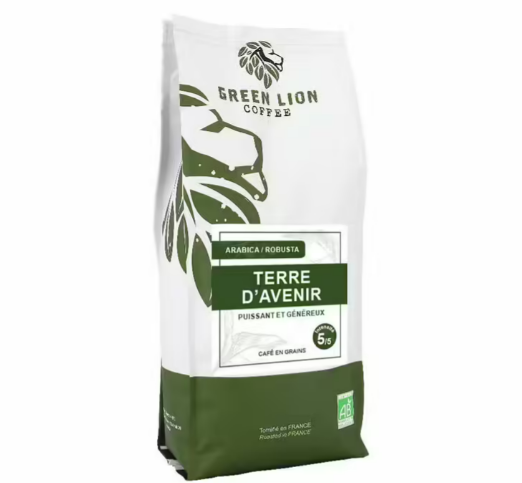
Coffee beans – Terres d’avenir – Green Lion Coffee (1kg)
– Arabica / Robusta blend
– Rich & sweet and spices aromas
– Notes of toast and dark chocolate
It’s clear that choosing the best organic coffee beans goes beyond just taste. Not only do they offer a delicious and flavorful cup of coffee, but they also promote sustainability, fair trade practices, and the benefits of organic farming. So next time you reach for your morning cup of joe, consider making the switch to organic. Don’t just take our word for it – try it out for yourself and experience the difference in each sip.
Discover all of our articles

